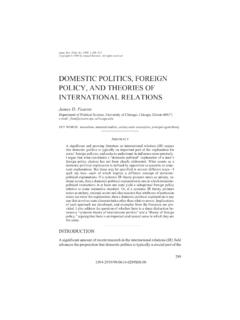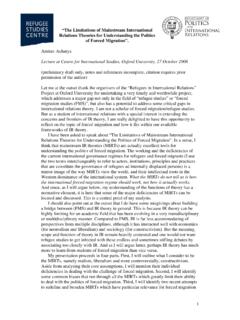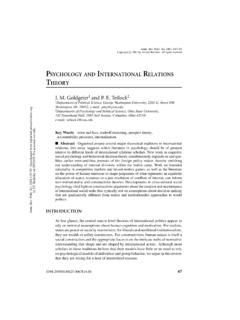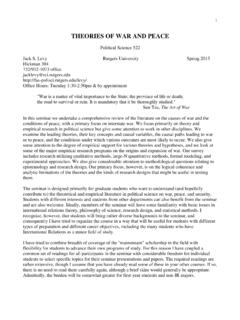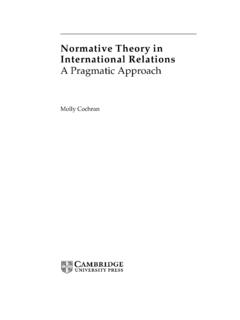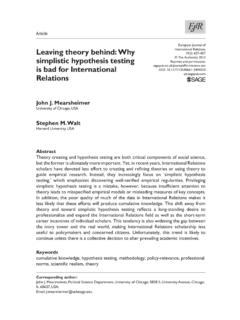Transcription of The International Relations theories; its strengths ...
1 British Middle East Center for Studies & Research Copyright 2012, British Middle-East Center for Studies & Research, All rights reserved F e b r u a r y 5 , 2 0 1 3 I The International Relations theories ; its strengths & weaknesses Critically assessing one of the International Relations theories in terms of its strengths and weaknesses as an explanation of contemporary International Relations Author: Artur Marsalis, International Relations Researcher ,University of Pisa British Middle-East Center for Studies & Research Copyright 2012, British Middle-East Center for Studies & Research, All rights reserved F e b r u a r y 5 , 2 0 1 3 II The pessimist complains about the wind; the optimist expects it to change; the realist adjusts the sails. - William Arthur Ward (Think exist, nd) The theory that will be assessed, as quoted above, is the theory of Realism.
2 This essay will be going through how realism applies to contemporary International Relations (IR) by providing examples of how they have proven to be accurate in explaining issues around the world today, but also how they may have been inaccurate in other cases. Realism is not a theory which is defined explicitly, rather many of those who study it, differ with regards to its interpretation. Some would argue that it consists within a general, normative state (Ferguson and Mansbach, 1988; p79). However, others would contend that it is in fact a loose framework (Rosenthal, 1991; p7) rather than having a structured, rigid definition. The opposing end of the spectrum, as Elman put it, a big tent, with room for a number of different theories (Elman, 1996; p26) resulting in the two former theoretical approaches being gulfed into one categorical approach.
3 It is the latter opinion that most analysts of realism take on. That it is not one simple theory, rather each view is merely a branch from the tree. One interpretation of realism that is unbroken amongst most commentators of the theory is that realists are individuals that believe the State is the principle actor in International politics and that they are very concerned with the balance of power. They argue that all the State s actions and choices are a reflection of the collective will of the people, which is also an argument put forward by Statists, albeit the fact that may come across more totalitarian, they still argue that the State is in fact a representative of its people (Liberty Blog, 2012).
4 It is because of the people s characteristics that the State acts the way it does. This is closely linked with Thucydides theory on human nature; that all humans are egoistic, power hungry and self-interested. They seek protection for themselves and exclude all others from this protection, unless in some circumstances they are to gain from this inclusion (Baylis, Smith and Owens, 2011; p89). This then builds the foundations for the State itself, making it an egoistic State, one which seeks to protect itself and assure its survival, even at the cost of other States falling, also known as absolute gain (Heywood, 2011; p67) A good example of this is East Timor and its relationship with Australia during the Second World War.
5 During the war: Australian and Dutch troops, acting under orders from Allied Command, landed in East Timor around the Christmas of 1941 to establish an offshore line of defence British Middle-East Center for Studies & Research Copyright 2012, British Middle-East Center for Studies & Research, All rights reserved F e b r u a r y 5 , 2 0 1 3 III against the advancing Japanese (Senate Foreign Affairs, Defence and Trade References Committee 2000). The Japanese forces were stopped, partly due to the remarkable close friendship that was forged with the Timorese, who supplied and protected the troops (Inbaraj 1995). As a result, Allied troop losses amounted to just forty soldiers, while the Timorese payed [sic] a higher price for their help, with as many as 40,000 (14% of the population) estimated to have been killed.
6 (Oxford University Press, nd) As a sign of gratitude Australia dropped leaflets as they left the country to thank the East Timorese for their help (Suter, 2001; p152-5). The realist argument here is that Australia acted in favour of its own protection and survival and cared little for East Timor, no matter how much it may have helped during the war. Thus, supporting the theory, in its definition of the self-interested and egoistic state. There are other examples of this, one which again involves East Timor and is conflict with Indonesia during the 1975-1999 periods. Here we saw Indonesia invade East Timor with only hours after the US President Gerald R. Ford and Henry A. Kissinger left a meeting with Suharto (Indonesian President) where they discussed whether Indonesia should or shouldn t invade East Timor.
7 President Ford gave his support to the Indonesian president and agreed to supply Indonesia with the entire arsenal needed for the invasion. Again we see that, even though the US is one of the 5 permanent members of the UN (a body that roots it s self on liberalism and the strive for peace) it still failed to approach this situation liberally. It only took into consideration the absolute gain it will accomplish from the invasion, which was mainly financial (through the production of arsenal needed by Indonesia) and by supporting Indonesia, it will now have another ally in the Easter Asian part of the world, one which is growing (The George Washington University, nd). When it comes down to war and the reasoning behind war, realists come across as being quite accurate and praiseworthy as they tend to argue points like war being inevitable , and it can be quite challenging to argue against that, with the numbers of war that have and are still taking place around the world.
8 Whereas Liberals would argue that war should be the last resort to any conflict, that there should be debate and negotiation between the opposing sides before any side goes to war. But we can clearly see this doesn t always take place with the simple example of the Second World War, or even more recently the 2003 Iraq war. Realists don t tend to give a solution to a problem, rather an explanation for it. That war happens because States British Middle-East Center for Studies & Research Copyright 2012, British Middle-East Center for Studies & Research, All rights reserved F e b r u a r y 5 , 2 0 1 3 IV are power hungry and because States fear for their own survival and so by abolishing other competition they guarantee their own existence. A perfect example of this would be the 2003 Iraq war.
9 Here we saw the US invade Iraq for many reasons, none of which were clearly specified. At first it was to disarm Saddam of his Weapons of Mass Destruction (WMDs). After the revelation that Iraq had no WMDs, Saddam suddenly became a dictator and the invasion was for the spread of democracy . In the words of the famous French Enlightenment s political philosopher, Jean Jacques Rousseau, the Iraqi nation was forced to be free (Liberty Blog, 2012). But on the consensus of most of the critics that looked at the reasoning behind the war, it was because the US had concerns regarding its security, following the 9/11 attacks. They felt that these terrorist groups may be getting too powerful and so they had to be removed. This clearly exemplifies the issue of survival and egoism.
10 The state here is in fear that the opposing state is challenging it, and so it must be dealt with. There were also interests in the region regarding the oil that Iraq possessed and so it can also be argued it was an issue of absolute gain rather than one of power and fear of opposition. These are in clear upkeep with the classical realism argument of the reasoning behind war. But if we are to look at this in terms of power and who manages power we see that the classic and Neo-realists view tend to be very rudimentary in their definition of it. Classical realists explain power as simply a military force, and those who attain it are the states (Heywood, 2011; p212). While Neo-realists tend to define power in terms of size of population and territory, resource endowment, economic capability, military strength , political stability and competence (Waltz, 1979; p131).

